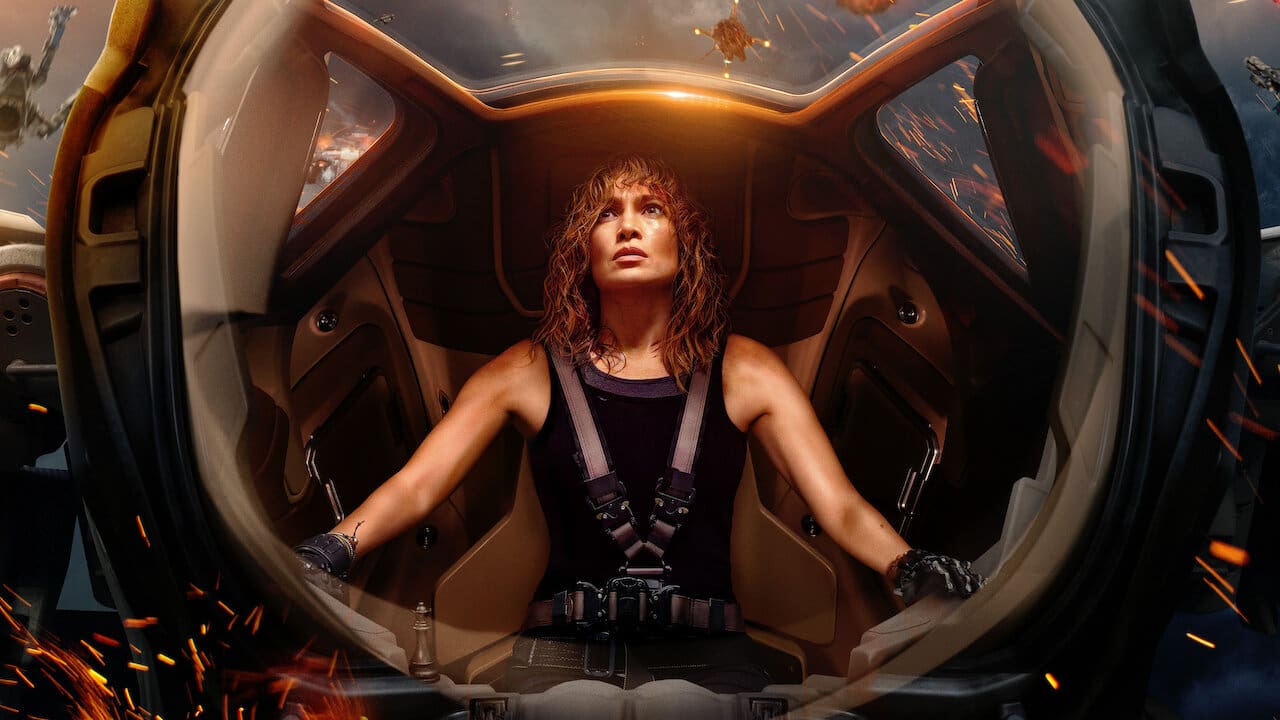
Netflix has continually tried to deliver blockbuster experiences in the comfort of its subscribers’ homes, the service but has mostly come up short. Most of the streamer’s high-budget original flicks, Outside of a couple hits like the Extraction movies, don’t have the creative power or quality control to really impress or entice audiences. Unfortunately, Netflix’s latest attempt to provide a summer blockbuster, Atlas, is an awful mess that’s visually subpar and vastly unremarkable.
The film takes viewers into a near future where AI develops so rapidly that the technology lives within human-like robots. Eventually though, a powerful AI named Harlan (Simu Liu) breaks from his program and becomes a deadly terrorist – slaughtering thousands of humans before escaping Earth. Now, years after Harlan fled, prolific data analyst Atlas Shepherd (Jennfier Lopez) embarks on a mission to capture him on a hazardous alien planet. However, Harlan’s forces separate Atlas from her platoon – leaving her stranded inside a mech suit with an AI program named Smith (voiced by Gregory James Cohen). Now, Atlas is forced to confront her unresolved past and develop a genuine bond with Smith as they discover Harlan’s true intentions.
Atlas follows a growing trend we’re seeing in film lately where big-budget action flicks twist in sci-fi elements involving AI. From original films like The Creator to recent entries in established franchises like Mission Impossible: Dead Reckoning, the debate on whether AI is humanity’s friend or foe now bleeds into more mainstream movies. Atlas doesn’t add anything special to the conversation though, and creates hollow depictions. Harlan is your basic “evil AI” that hates humanity for its generic flaws and Smith is the “good guy” because of its wittiness and willingness to help Atlas at every turn. It’s such a simple and uninteresting perspective on AI that plays into stereotypical character writing. The film barely offers any debate or concepts around AI – meaning that it totally flops on its premise – and can’t even capitalize on some of the intriguing elements of its titular character’s story arc.
There are engaging aspects to Atlas’ distrust of AI early on – like her desire to always have the upperhand shown through chess matches and a surprisingly tense interrogation scene. However, the film’s serious tone and depiction of Atlas’ paranoia aren’t maintained well at all. Once it’s just Atlas and Smith trying to survive the film basically throws anything serious out the window and becomes a snarky buddy adventure. Atlas totally loses her more reserved qualities which actually makes Lopez’s early performance pretty distinct and then she, well, plays herself. Her and Smith are constantly trading sarcastic remarks and witless jokes that quickly become overbearing. It’s what makes the film and performances take such a generic turn and it’s likely where viewers will start to tune the film out because it’s so forceful in trying to feel comical – to the point where it’s the most unappetizing junk food for action flicks. Plus, the emotional aspects of Atlas’ arc are completely surface level, so later attempts to make viewers connect to her completely fall flat.
Frankly, none of the performances ever come off as anything more than familiar despite the film boasting a pretty talented cast. Sterling K. Brown brings a pretty standard sense of doubt, sarcasm, and vindictiveness that makes him seem like more of an enemy to Atlas than an ally. Then, his performance matches the same unremarkable snark that Lopez presents and it makes his character come off like a pointless action sidekick. Cohen’s voice performance is restricted to sounding like a typical, monotone AI voice and while that can lead to a couple flashes of funniness, it doesn’t leave much of an impression. Even for someone with such breakout potential like Liu, he isn’t given the power to be something special in this film. Rather, he’s a stock robot villain who becomes tiresome almost immediately.
Atlas’ action makes the experience even more unbearable because it’s clogged up with some of the worst looking visual effects you’ll see this year. While there are decent stretches of combat that can be fun and a couple of surprisingly visceral moments that’ll catch viewers off guard, the visuals are a genuine eye sore. When ships and mechs are fighting, the visuals are incredibly cheap and unappealing. It’s far too blurry at times and sticks out so poorly that it’s just a blatant distraction. There are even some backgrounds that straight-up look like a computer wallpaper was just pasted behind certain scenes and noticeable green screen sections that are just unacceptable for a film of this scale. If Netflix is serious about trying to deliver high-caliber blockbusters, then they seriously need to prioritize quality control because Atlas makes it seem like they don’t care in the slightest.
Atlas is just another big-budgeted blunder from Netflix that struggles to really impress on any level and often fails to distinguish itself as anything more than another action film trying to shamelessly capitalize on the ongoing AI discourse.

